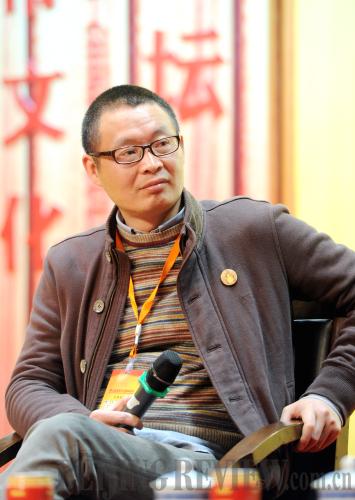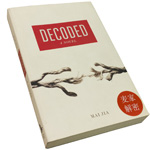|
 |
|
(CFP) |
For an author who writes novels about cryptography, it must be said Mai Jia has, himself, an enigmatic presence. Speaking at one of the flagship events of the eighth annual Bookworm Literary Festival, the author's pose is calm and pensive as he reclines, listening as his interpreter in whispers rapidly translates the questions asked by the event's host into Mandarin. But though his body language is relaxed, his eyes are alert and alive as he scans the audience. He exudes a curious type of latent electricity.
 |
|
Decoded, by Mai Jia, Olivia Milburn, Christopher Payne (Translators) |
An English-language translation of Mai's first novel Decoded was recently released, receiving plaudits from critics on both sides of the Atlantic. Some have speculated that Mai is the first of a veritable tsunami of Chinese writers whose work will soon flood foreign shores as China goes full steam ahead to open itself both culturally as well as economically. The plot concerns one Rong Jinzhen, a semi-autistic mathematical genius who, in the 1960s, is tasked with cracking two elusive codes, both designed by a former friend and mentor.
Mai admits that there is a lot of himself in his literary creation. Rather heartrendingly, he admits that as a child, he displayed autistic tendencies and found it very difficult to make friends. The fact that his family enjoyed a very poor reputation did not help matters. Growing up during the "cultural revolution (1966-76)," his father was a rightist activist and one of his grandfathers a landlord, circumstances which, to say the least, would not have been viewed favorably at the time. Saying that it would be difficult to imagine an exact Western analogue, he says that it would be like having a father who was a convict and a mother who was "involved in a certain illicit profession," a remark that elicits gasps of laughter from the audience.
Owing to his family's low status, Mai was often subject to teasing and bullying. Thus, he found solace in his diary, which he admits was his only friend and "pressure valve." He maintained the practice of keeping a diary from the age of 12 until 33. Though he claims this habit helped him enormously in his development as a writer, it didn't aid him in the development of his social skills, he compares the process both to "an addiction" and a "double-edged sword." Although he recommends that writers keep a diary, he adds, with wry humor, "in moderation."
Neighbor of spies
Echoing Mai's childhood troubles, the original Chinese version of Decoded, published in 2002, had a difficult birth. It took 11 years to write, an arduous process that brought him "to the brink of despair," and the work represents a labor of love for the novelist. Although he has personally adapted two of his novels for the screen, he states that he never wants to see Decoded in another medium. It also broaches subjects that may have, understandably, ruffled some feathers at its time of publication.
Mai describes himself not as a spy but a "neighbor of spies," claiming that his university was a recruitment ground for people working in intelligence and that he himself was almost recruited but, owing to a twist of fate, ended up working close by in publicity and telecommunications instead. Mai also claims that redeeming his family's reputation after the "cultural revolution" ended was a key factor in his deciding to join the army.
Having recognized his unique talents, his superiors recommended that he go to work as a writer. Shortly prior to his first novel's release, concerns were voiced that the book may reveal state secrets. Reasoning that he would withdraw the novel if there were widespread consensus that it indeed did compromise national security, Mai sought the consul of his old colleagues, the cryptographers.
|
